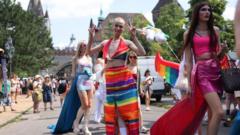On June 28, Budapest's liberal mayor, Gergely Karacsony, declared that the city's local event, styled as a "Day of Freedom," will still take place despite the police's ruling. The standoff highlights the ongoing tensions between Prime Minister Viktor Orban’s Fidesz government and Hungary’s LGBTQ community. Fidesz has faced criticism in past months over a law perceived to limit freedom of assembly and expression, claiming to prioritize child protection above all else. While authorities argue that the event poses risks for underage citizens, Karacsony contends that such a gathering should be recognized as part of the democratic rights of assembly, irrespective of the prevailing government stance.
**Budapest Mayor Defies Police Ban on Pride March, Plans 'Day of Freedom'**

**Budapest Mayor Defies Police Ban on Pride March, Plans 'Day of Freedom'**
Hungary's police force has prohibited the Budapest Pride march scheduled for later this month, but the city's mayor has pledged to proceed with the event.
Recently, the local government announced that the Pride march would be rebranded and organized as a separate event, distancing it from conventional Pride celebrations that include elements deemed inappropriate for children. The intervention by the police and the court decisions concerning the gathering are reflective of the broader struggle surrounding LGBTQ rights in Hungary, with mounting public and legal disputes indicating a growing divide within society.
The government’s legal adjustments, aimed at restricting such gatherings, have been met with fierce opposition from activists who maintain that the evolving framework is a means to suppress freedom of expression. The event is expected to draw participation from individuals across Hungary and beyond, despite the looming police presence and potential fines. As advocates plan for mass attendance as a show of solidarity, the Hungarian Helsinki Committee has advised attendees on their rights in the face of police action, emphasizing a collective push against the perceived governmental overreach.
In light of these developments, the Pride-related events promise to be a focal point of civil rights dialogue in Hungary, further illustrating the intersection between political authority, social progress, and collective identity.
As advocates gear up for crucial moments in the LGBTQ rights campaign, September's action symbolizes not just a march but a push against legal and sociopolitical boundaries set forth by the ruling regime.
The government’s legal adjustments, aimed at restricting such gatherings, have been met with fierce opposition from activists who maintain that the evolving framework is a means to suppress freedom of expression. The event is expected to draw participation from individuals across Hungary and beyond, despite the looming police presence and potential fines. As advocates plan for mass attendance as a show of solidarity, the Hungarian Helsinki Committee has advised attendees on their rights in the face of police action, emphasizing a collective push against the perceived governmental overreach.
In light of these developments, the Pride-related events promise to be a focal point of civil rights dialogue in Hungary, further illustrating the intersection between political authority, social progress, and collective identity.
As advocates gear up for crucial moments in the LGBTQ rights campaign, September's action symbolizes not just a march but a push against legal and sociopolitical boundaries set forth by the ruling regime.


















